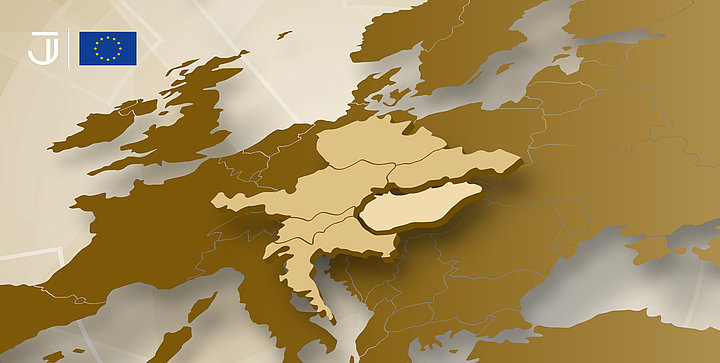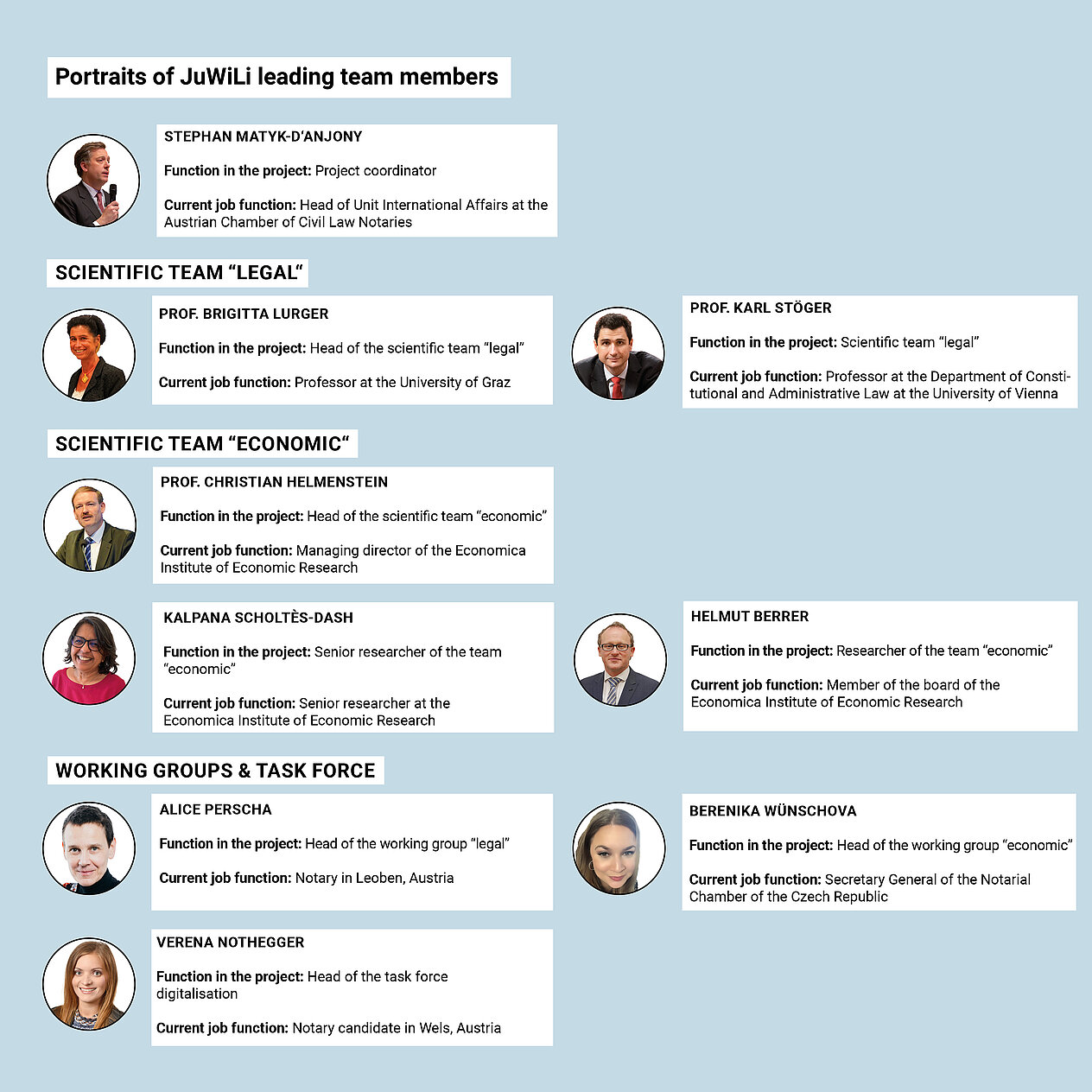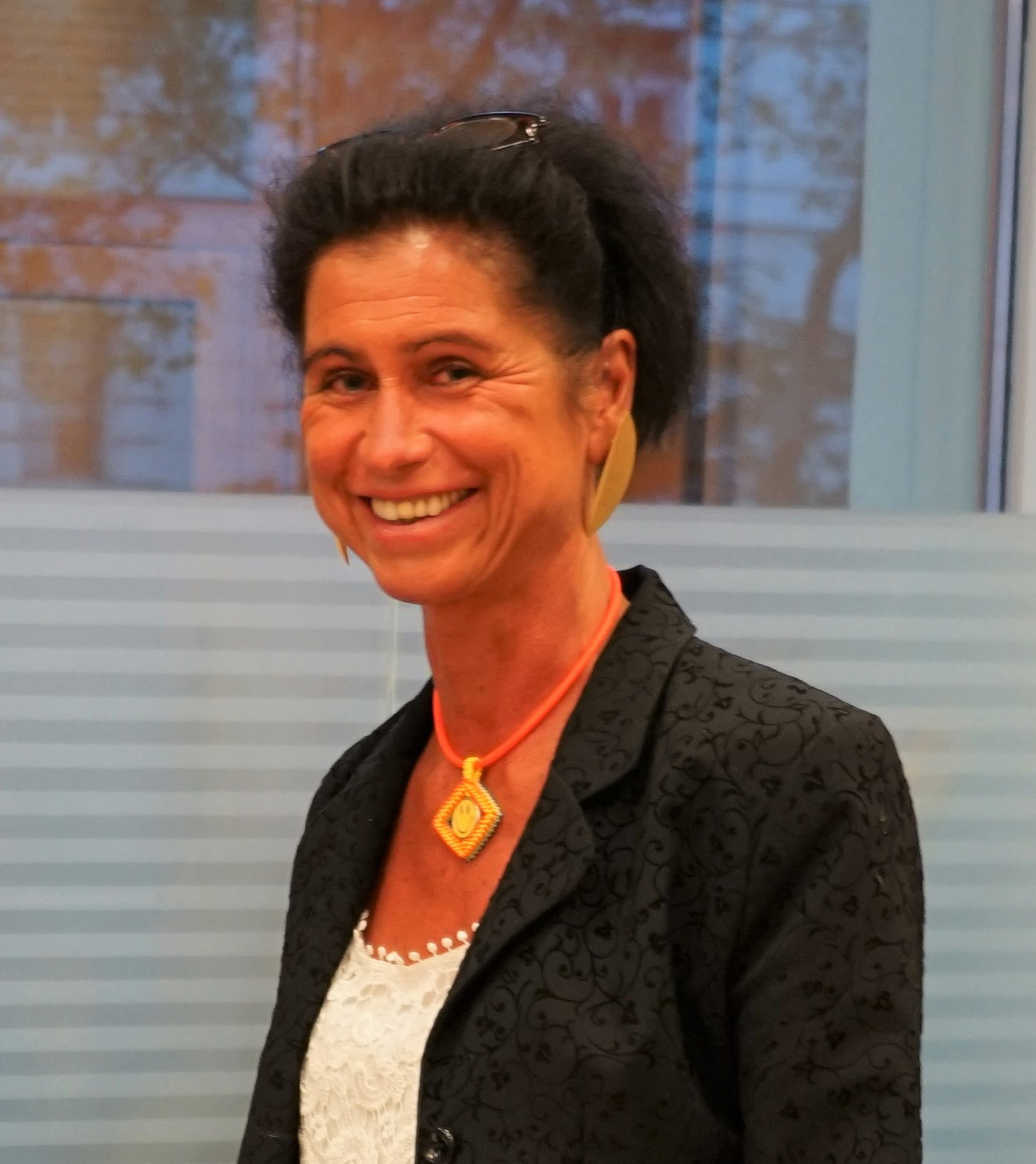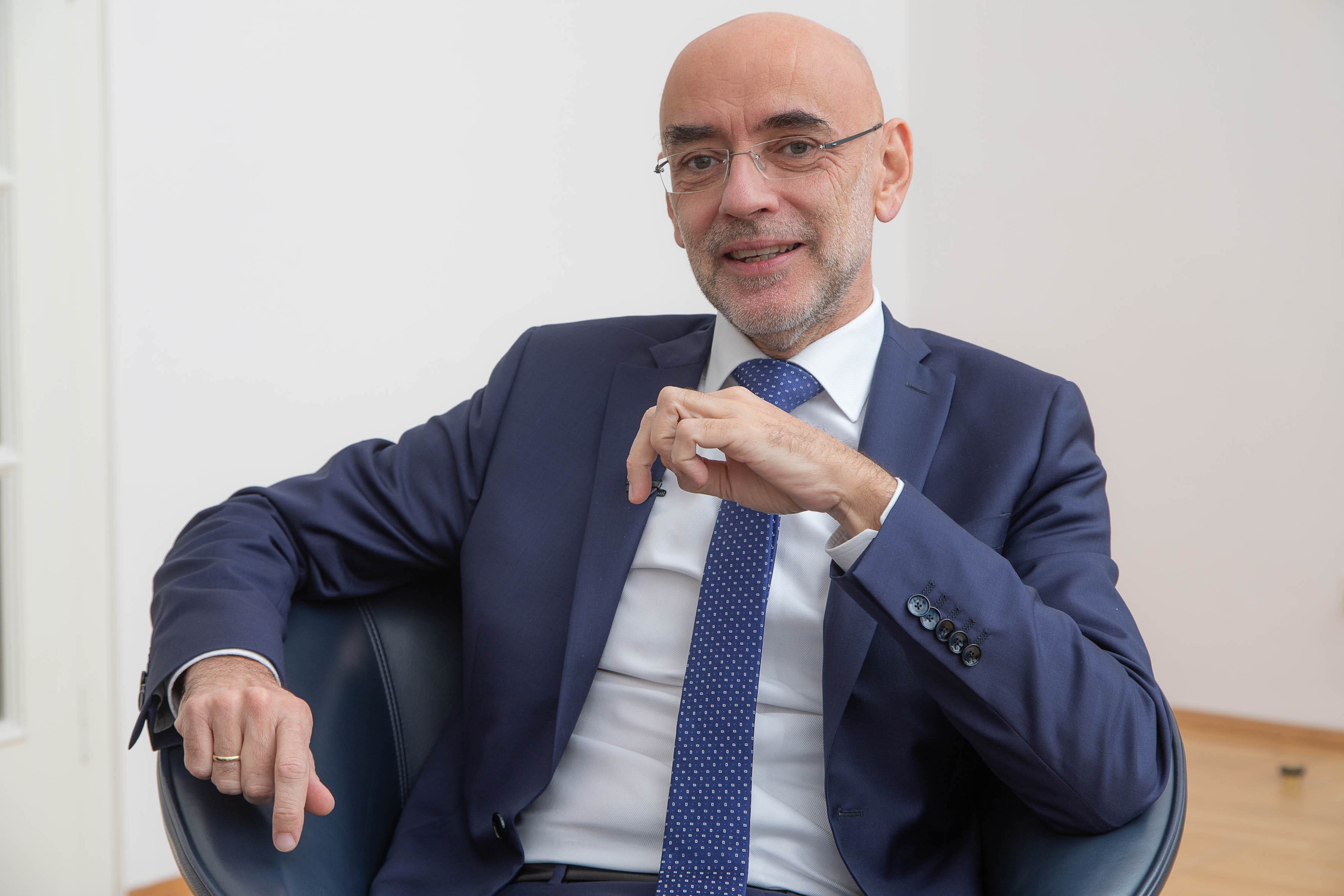
The project “Justice without Litigation for Europe” (JuWiLi), co-financed by the European Union under the Justice Programme, has been launched on 1 December 2020. The project’s core objective is an in-depth analysis of non-contentious judicial proceedings (frequently carried out by notaries) in the participating countries, against the background of the term “court” in EU instruments. Project partners of the two-year project are the chambers of notaries of Austria, Croatia, Czechia, Slovakia and Slovenia, the Universities of Vienna and Graz, the Economic Research Institute Economia and the Council of Notaries of the European Union (CNUE).
This project is funded by the European Union’s Justice Programme (2014-2020).
The content of this website represents the views of the author only and his/her sole responsibility. The European Commission does not accept any responsibility for use that may be made of the information it contains.
In Austria, Croatia, Czechia, Hungary and Slovakia exists a legal particularity that notaries exercise court functions, in particular in succession procedures, but also in other fields of civil justice (e.g. family law, order of payment). In Slovenia reflections are ongoing since some years already on the introduction of such court functions for notaries for succession cases. Taking these elements into account, a deeper look into the notaries’ court function needs to be taken in the context of the EU legal framework.
The project analyses for Austria, Croatia, Czechia, Hungary and Slovakia the term "court" under the EU Succession Regulation in the context of non-contentious judicial procedures by notaries from a comparative law, fundamental rights and rule of law viewpoint. The project also includes Slovenia where reflection by policy-makers, academia and the chamber of notaries on transferring court tasks to notaries is progressing.
Against that background, the project aims at improving the application of the EU Succession Regulation through a better knowledge and understanding of court functions exercised by notaries in the above-mentioned EU Member States. Since the term “court” has been expanded by the Succession Regulation and other EU instruments to legal professionals (e.g. notaries) exercising court functions, the project aims at identifying common minimum procedural standards which enable fulfilling the criteria of the concept of “court” set by EU law. The project also analyses fundamental rights aspects and rule of law requirements in the participating Member States. On that basis, recommendations addressed to lawmakers at EU and national level will be presented.
The economic part of the project carries out an in-depth analysis of the Civil Law Notaries’ function as court commissioners to assess social as well as economic benefits resulting from these non-contentious judicial procedures. The study includes a major data collection exercise to identify as well as quantify important economic and legal advantages that can arise from the reduction of ex-post legal expenditure of an economy. The data collected are used for developing composite indicators to provide a comprehensive mapping of non-contentious judicial services aiming at disburdening the judicial system. For this, the legal acts and the respective litigation preventive judicial services shall be compared in their substance and reach in order to better reflect non-contentious judicial procedures in the European Justice Scoreboard or in the work of CEPEJ of the Council of Europe. On that basis, new indicators will be developed to better reflect non-contentious judicial procedures in these instruments. Recommendations and conclusions addressed to policymakers will be presented.
Finally, as a contribution to better enforcement of judicial decisions through better procedures, case-handling and cooperation in cross-border civil cases, the project aims at putting in place a specialised online cooperation mechanism by expanding CNUE’s ENN (European Notarial Network) and thereby facilitating communication between notaries exercising court functions in Europe. This enhances mutual trust in such procedures and complements mutual assistance tools such as the EJN in civil and commercial matters.

Voices on the project

Your impressions of the project:
Even the first preparatory meeting for the application – even before Covid – showed that “united in diversity” applies not only to Europe, but also to the functions of notaries as support of the judiciary in the Central European States. All meeting participants have shared the enthusiasm to make available the experiences of their own legal order to the others and thereby to mutually learn from each other.
Why is this project important from your point of view?
In many European countries, notaries fulfil judicial functions for which the legal qualifications and scope are quite controversial and there is no uniform picture. This project will provide an inventory of such tasks and functions, which in any case in the Central European area, could enable a certain degree of standardisation of relevant notarial tasks, which is in turn in the interest of the internal market.
What perspectives can this project develop?
A fast-working judiciary is an asset for every business location. At the same time, there is sufficient know-how within the notaries of Central European States to support and disburden courts in certain areas even more than today by taking over “non-contentious judicial tasks”. JuWiLi also aims at raising awareness at the European Union level and, at the same time, contribute from a scientific point of view to a better understanding of the human rights’ concept of “court”.

Your impressions of the project:
When Mr. Mag. MATYK d’Anjony has contacted me some time ago and has raised the idea of this project, I was immediately enthusiastic. Indeed, from an academic and practical point of view, it has come across a “wound point” of EU law: Over the past two decades, the EU has taken a positive view on the free movement of private law relations (e.g. law of obligation, inheritance and family law). However, the EU has overlooked the fact that its system based on the settlement of litigious cases does not work, particularly in areas where non-contentious proceedings or notarial regulations prevail. For example, the new EU successions regulation has been the subject of decisions of the European Court of Justice on several occasions, which have not improved the situation.
Why is this project important from your point of view?
The project is significant in two respects:
1. For the first time, the project develops fundamentally – i.e. from a constitutional, private, comparative law and economic perspective – the cross-border regulation of private law relations by the EU, outside litigious procedures and which is up to now (almost) a “blind spot” in EU law. In other words, it shows where these regulations work well or less well, even depending on the national laws in these areas.
2. The project builds a bridge between EU legislation and notarial practice in various EU Member States. It is precisely this link that seems essential to me for a high-quality legislation and the application of law within the EU.
What perspectives can this project show?
The benefit of the project is clear: The results of the research will show which solutions according to legal and economic standards in the non-contentious area of regulation supported by independent legal professionals appear desirable in cross-border succession cases, marriages and other private law relations, and what kind of (improved) legal rules can lead there. In the end, we aim at presenting clear recommendations for improving the application of law and, above all, of EU legislation.

Why is this project important from your point of view?
First, it is important because of the project’s strong Central European direction by the consortium of the Hexagonal partners, thereby strengthening the close cooperation of these organisations participating in the project, this on the basis of a common legal culture. In addition, for the first time, the non-contentious court proceedings conducted by notaries in these countries will be examined in a comprehensive scientific cross-border format, taking into account the background of EU legislation. In addition, the project aims at contributing to clarifying the term “court” at EU level and will develop proposals for appropriate requirements for procedural standards.
What perspectives can this project develop?
The EU legislator has extended the concept of “court” to other authorities exercising judicial functions, such as the notary as a court commissioner. The project aims at making use of this trend. The development of European standards in non-contentious court proceedings, combined with the requirements for the function of the notary as “court” are central elements of the project. In addition, perspectives could be developed for the further transfer of non-contentious judicial tasks to notaries based on comparative law, fundamental law and economic analysis and evidence. In a number of areas of law, this could be of interest from an Austrian point of view.

Your impressions about the project?
To my knowledge, this is the first time that the notariats of Central Europe have worked together in the framework of a project supported by the European Union, and this is something remarkable. We share a common legal culture, strong links and the particularity of exercising jurisdictional functions, especially in succession procedures. The JuWili project presents an excellent opportunity to analyse the role of the notary in this context, against the background of recent developments in European law. Let us cultivate our identity and bet that this project will be the precursor of many others to come.
Why is this project important from your point of view?
This project is important for several reasons:
- Firstly, for the first time, non-contentious court proceedings conducted by notaries in the countries of the project will be examined from a scientific perspective, taking into account the context of European legislation.
- This in-depth examination will make it possible to identify common minimum procedural standards, in order to fulfil the criteria of the concept of "court" laid down by European law.
- Finally, the project will not be a mere "pro domo" plea thanks to the economic approach that will accompany it. It will be interesting to be able to quantify the economic benefits of transferring certain court competences to notaries.
What perspectives can this project show?
The networking of European notaries is a long-standing objective of the CNUE. With this in mind, we have set up the European Notarial Network (ENN - www.enn-rne.eu). The ENN assists notaries in the handling of cross-border cases by offering a series of practical and information tools via a secure platform. The JuWili project will make a direct contribution to this networking objective by creating a specialised cooperation mechanism via the ENN for notaries exercising judicial functions. The ENN currently has almost 2000 users and the project will further expand this base.

Your impressions of the project:
Crisis, including the Covid-19 pandemic, tend to draw attention to current events. In order to counter the economic damage caused by this, politics initially focused on stabilising interventions in the form of various “aid packages”. In two respects, however, the JuWiLi project is not a child of Covid-19: On the one hand, the preparatory work on this has begun some time before the outbreak of the pandemic. On the other hand, with the imminent end of the Covid-19 acute phase, it is now necessary to give priority to projects which are shaping structures. The joint ambition of all project participants was the same pre- and post-Covid: paving the way for social and economic prosperity through the further development of legal institutions.
Why is this project important from your point of view?
The institution of the notariat of the Hexagonal countries has always been characterised by a high readiness for both technical and institutional innovation. The JuWiLi project underlines this open forward-looking attitude of the notariats by its interdisciplinary character combining legal, economic and mathematical expertise. A cross-disciplinary understanding of language, as well as mutual understanding and trust between the project partners, built on a long-standing collaboration especially in the CNUE context, serves to this goal. Most of the time, such interfaces are used to create something new.
What perspectives can this project show?
A whole range of new results can be expected from the JuWiLi project. Firstly, a number of transnational, qualitative and quantitative indicators will be developed. These should be suitable for inclusion in the European Commission’s Justice Scoreboard. The same, like the CEPEJ database, serves as the basis for evidence-based policy formulation, so that it is advisable to supplement it with indicators of the out-of-court administration of justice.
The project then focuses on the manifold potentials of the non-contentious judicial procedure by increasing the involvement of the notary. In economic diction, this is the externalisation, the “outsourcing”, of legal services to the notary otherwise to be provided by the state. The herewith associated pooling of core competencies results in a generally higher process efficiency (in terms of length of procedures, costs, etc.) with corresponding savings potential. In addition, a wider use by the population of the available litigation-preventive and litigation-avoiding legal instruments, thereby promoting legal certainty, while at the same time an unburdening effect for courts.
Finally, the project will demonstrate, both on the basis of best practices from the Hexagonal States and on the basis of exploratory approaches, how the previously developed advantages of the inclusion of the notary in the digital age can be tapped. Specifically, the aim is to determine those process innovations, which especially in non-contentious proceedings ensure and promote legal certainty effects.

Your impressions about the project?
CNUE has a very positive impression about the objectives and the methodology of this project, about the way it is managed and we are very grateful to the initiators for the role that was attributed to us. As partners in the project, we were entrusted by the participating Notarial Chambers from Central Europe to create a section on the IT platform of the European Notarial Network that is meant to facilitate the communication and cooperation among their notaries in cross-border succession cases. Our cooperation with the project team is smooth and fruitful and we have been very happy to create synergies between the European Notarial Network and the JuWiLi project.
Why is this project important from your point of view?
Besides the concrete role played by the CNUE as a partner in this project, JuWiLi is very important for the us since it is a project at the heart of six of our members from Austria, Hungary, Slovakia, Czechia, Croatia and Slovenia. The CNUE is very much committed to support the initiatives of its members.
Moreover, this project is very interesting for us also from a scientific point of view since it aims at studying in depth a specificity of the notariats from the Central European countries which, in matters of non-contentious successions, act at the service of Courts. The CNUE is currently undertaking an analysis of the application of the Regulation EU/650/2012 on Successions and from in the framework of another project co-funded by the EU - “MAPE – Successions”. I believe that these two projects are complementary efforts of the European notariats in supporting the good application of EU law, its improvement and its good articulation with the national legal systems and institutions.
What perspectives can this project show?
The JuWiLi project will certainly open perspectives about the way the notaries can efficiently support the functioning of the Justice systems in the EU by reducing workload of courts and administrations and by cooperating closer in successions files with cross-border element. This is a clear contribution of the notariat to the EU integration in areas that interest mostly the citizen since they refer to the legal relationships that mark the life of a family, in this case the transfer of the property to the next generations.
The tools provided by the JuWiLi project will certainly inspire the notaries from the entire EU to cooperate on concrete files in the framework provided by the European Notarial Network IT infrastructure. With the scientific deliverables, the project will increase mutual knowledge and trust in foreign legal systems and professionals and has the vocation to make notaries across borders aware of the key role that they play in the ”day-to-day rule of law”, that concerns that overwhelming majority of EU citizens who do not enter in contentious cases but who simply need legal certainty and predictability when it comes to our legal relationships.















